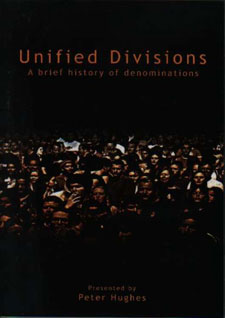Peter Hughes, the Sydney area director for the Australian Fellowship of Evangelical Students (AFES), has provided a short, interesting look at Church History from a Protestant point of view. He covers a lot of territory in about 20 minutes, and manages to explain things simply and without running down the individual denominations he talks about. He begins by asking why there are so many denominations, given that our Lord Jesus prayed in the prayer recorded in John 17 that his church might be united.
 Although Hughes refers to hundreds of churches, the Encyclopaedia Britannica says that there are more than 22,000 registered Protestant denominations. So it is certainly right to ask why, and whether this is the way that God wants his church to be. Throughout the talk, Hughes stresses that being involved in a local church which keeps the focus on Jesus and his message is the way we should be living out the unity which Jesus prayed for.
Although Hughes refers to hundreds of churches, the Encyclopaedia Britannica says that there are more than 22,000 registered Protestant denominations. So it is certainly right to ask why, and whether this is the way that God wants his church to be. Throughout the talk, Hughes stresses that being involved in a local church which keeps the focus on Jesus and his message is the way we should be living out the unity which Jesus prayed for.
The talk is divided into six segments that are 2 to 4 minutes long. Peter walks around St Philip's Anglican Church in York St, Sydney as he delivers his talk, which breaks it up a bit for viewers who are watching the talk from start to finish. These segments cover the history of the church from its beginning in Acts 2 on the day of Pentecost, through the declaration of Christianity as the official religion of the Roman Empire by Constantine in AD313, the division into East and West in 1054, the Reformation, the development of state and later non-state churches, the beginnings of Methodism under the Wesleys and into the 20th Century. Hughes cites university student ministry as an important development of the 20th Century, along with world mission, ecumenicalism and Pentecostalism. He tells us that church union can be a negative thing when the new group struggles to find its identity and loses the focus on Jesus, as he says happened with the Uniting Church of Australia. Some in the Uniting Church know who they are and what they believe, he is quick to add, but organisational unity is not in and of itself necessarily a positive thing.
His summary at the end of his talk is worth reporting here, because in it he makes a number of challenging points. He tells us that true believers are already united by their faith in Christ. All Christians should "find other followers of Jesus and help them, no matter who they are, what they call themselves, or where they come from." He tells us we should not think we can find a perfect church, or be satisfied if we think our particular denomination is the closest to the Bible. "Each church needs to be assessed, not on its denominational affiliation, but on what it teaches and what it does." We should not be concerned that there are many denominations, because "throughout history God has continued to work through his people: sometimes drawing them together; sometimes dividing them up and sending them out into the world."
All Christians would benefit from Hughes' concise, but reliable summary. For those who have never heard the story before, this is a good beginning, though his academic language might be a little challenging occasionally for some younger Christians. I could see the talks being used effectively in a young adults home group, where the leader has prepared some questions to ask after each segment.





















